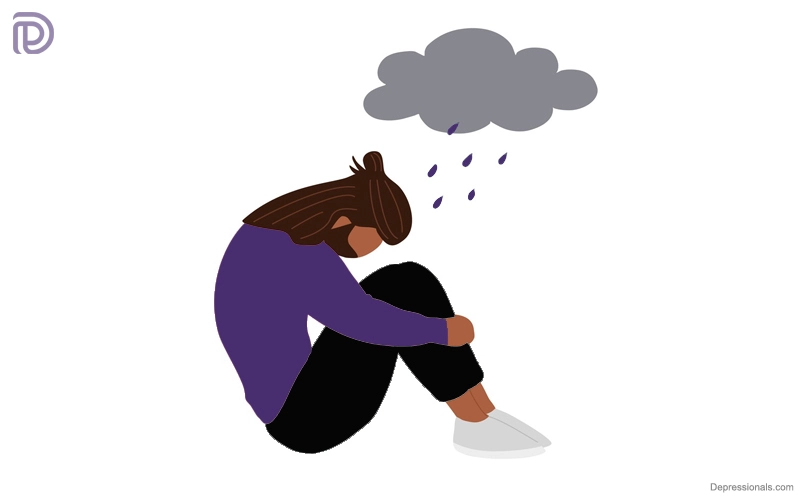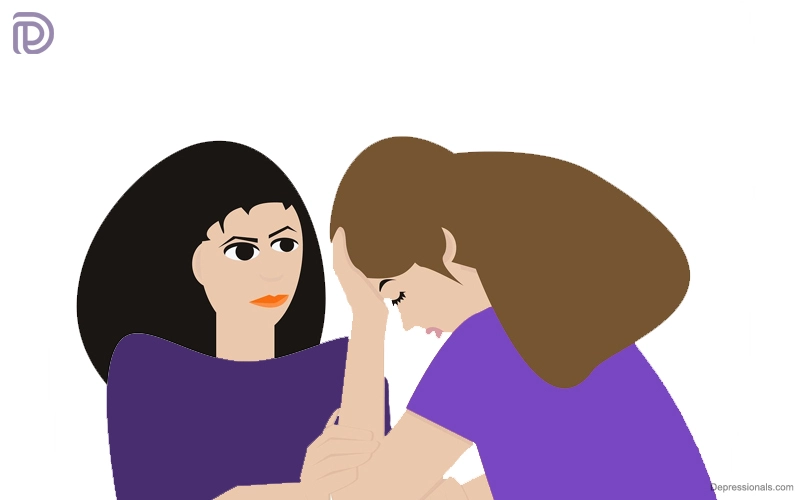Somatic symptom disorder (SSD once recognized as “somatoform disorder” or “somatization disorder”) is a kind of mental disorder that produces one or more physical symptoms such as discomfort.
The symptoms may or may not be linked to a physical cause, such as general medical problems, mental disorders or substance abuse. But the individual is experiencing them and thinks they are unwell (that is not faking the illness). Regardless, they produce disproportionately high amounts of discomfort.
Somatic symptom disorder is diagnosed when a person’s attention is drawn to physical symptoms such as pain, weakness or shortness of breath to the point that it causes substantial discomfort and/or difficulties functioning.
Difference between somatic symptom disorder and illness anxiety disorder
People with illness anxiety disorder are preoccupied with fear of getting ill or being ill. Physical symptoms are not usually experienced by someone with illness anxiety disorder, in contrast to someone with somatic symptom disorder.
Difference between conversion disorder and somatic symptom disorder
There is no physical or neurological cause for conversion disorder (functional neurological symptom disorder), which affects the function of the nervous system. You may experience symptoms such as changes in perception, sensation, or mobility as a result.
Even though conversion disorder is commonly associated with depression and anxiety, excessive worrying about the physical symptoms isn’t included in the diagnosis. The main characteristic of somatic symptom disorder is excessive concern about physical symptoms.
Read: Factitious Disorder
Causes
Although the actual cause of somatic symptom disorder is unknown, any of the following factors may contribute:
- Increased sensitivity to pain due to genetic and biological factors
- Family influences, which may be hereditary, environmental or a combination of the two
- Negativity is a personality characteristic that may affect how you recognize and experience disease and physical symptoms
- Reduced awareness of or difficulties processing emotions, allowing physical symptoms to take precedence over emotional concerns
- Learned behavior, such as the attention or other advantages obtained from having an illness; or “pain behaviors,” such as excessive avoidance of activities, which may raise your symptoms of the disorder
Read: Thought Disorder
Somatic symptom disorder symptoms
The following are examples of somatic symptom disorder symptoms:
- Whether it’s specific feelings like pain or shortness of breath or more general symptoms like tiredness or weakness,
- Unrelated to any known medical cause, or a medical condition such as cancer or heart disease, yet more significant than what is often anticipated
- A single symptom, a group of symptoms or a series of symptoms
- Mild, moderate or severe
The most frequent symptom is pain, but whatever your symptoms are, you have excessive thoughts, emotions or behaviors associated with them, which create major difficulties, make it difficult to work and maybe debilitating.
These are some examples of thoughts, emotions and behaviors:
- Worrying about becoming sick regularly
- Normal bodily feelings are seen as a symptom of serious physical disease.
- Even when there is no proof, people worry that their symptoms are severe.
- Believing that physical sensations are dangerous or frightening
- Feeling that your medical assessment and treatment were insufficient
- Concerned that physical exercise may harm your body
- Checking your body for irregularities daily
- Frequent medical appointments that do neither relieve nor worsen your problems
- Being resistant to medical therapy or being too sensitive to the adverse effects of medications
- Having a more severe impairment than is typical of a medical condition
More significant than the physical symptoms you encounter with somatic symptom disorder is how you interpret and respond to them, as well as how they affect your everyday life.
Read: Body-Focused Repetitive Behavior
Risk factors
The following are some of the risk factors for somatic symptom disorder:
- Having anxiety or depression
- Having or recovering from a medical condition
- Having a high chance of acquiring a medical issue, such as a significant family history of illness
- Experiencing traumatic experiences, trauma or violence in one’s life
- Having gone through a traumatic event in the past, such as sexual assault as a kid
- Having a lower socioeconomic position and a lower education level
Diagnosis
- One or more physical symptoms that are bothersome or interfere with everyday living
- Excessive thoughts, emotions, or actions associated with at least one of the following physical symptoms or health concerns:
- Continuous thoughts that are out of proportion to the severity of the symptoms
- Anxiety about health or symptoms that persists
- Spending an excessive amount of attention and focus on symptoms or health problems
- At least one symptom is present all of the time, but various symptoms may appear and go
People with somatic symptom disorder usually see their primary care physician instead of a psychiatrist or other mental health specialist. People who suffer from somatic symptom disorder may find it difficult to recognize that their worries about their symptoms are excessive.
Even if they are given proof that they are not suffering from a severe illness, they may remain frightened and concerned. Some individuals just experience pain as a primary symptom. By the age of 30, most people have developed a somatic symptom problem.
Read: Motor Disorders
Somatic symptom disorder-related disorders
Psychiatry has recently identified a number of disorders linked to SSD. These are some of them:
- Illness Anxiety Disorder (previously known as Hypochondriasis). This personality type is concerned with the fear of contracting a severe illness. They may mistakenly think that mild ailments are symptoms of more severe medical issues. For example, people may think that a typical headache is a symptom of a brain tumor.
- Conversion disorder (also known as Functional Neurological Symptom Disorder). People with neurological symptoms that can’t be linked to a medical cause are diagnosed with this disease. Patients may have symptoms such as:
- Weakness or paralysis
- Movements that are unusual (such as unsteady gait, tremor or seizures)
- Blindness
- Hearing loss
- Numbness or loss of feeling
- Seizures (known as pseudoseizures and nonepileptic seizures)
Conversion disorder symptoms are typically worsened by stress.
- Other Specific Somatic Symptom and Related Disorders. This category includes conditions in which somatic symptoms last less than six months or involve a condition known as pseudocyesis, which is a false belief that a woman is pregnant that is accompanied by other outward signs of pregnancy, such as an expanding abdomen, labor pains, nausea, fetal movement, breast changes and menstrual period cessation.
Read: Tic Disorders
Somatic symptom disorders treatment
Patients suffering from SSD may adhere to the notion that their symptoms have a physical basis despite a lack of proof. Alternatively, if their symptoms are caused by a medical condition, they may not realize that the level of distress they are feeling or exhibiting is excessive. Patients may often reject any notion that their symptoms are caused by mental issues.
Getting treatment with SSD requires a good doctor-patient connection. Seeing a single health care professional who has dealt with SSD before may help you avoid needless testing and treatments.
Treatment focuses on increasing everyday functioning rather than symptom management. Reducing stress is often an essential component of getting well. Family and friend counseling may also be beneficial.
Cognitive behavioral treatment may assist to alleviate the symptoms of SSD. The emphasis of the treatment is on correcting:
- Distorted thoughts
- Unrealistic beliefs
- Anxiety-producing behaviors
Caring for a loved one
A life-threatening illness may not be the cause of physical symptoms that are considered to be somatic symptom disorder. When someone suffers from symptoms, reassurance does not always help. It is important to encourage your loved one to seek mental health treatment in order to learn how to cope with the reactions to symptoms and any disabilities that may result.
A person with a physical disability may need extra physical and emotional care, which can stress caregivers and create tension between families. A mental health professional can help you address your own needs if you feel overwhelmed as a caregiver.
Complications
The following can be associated with somatic symptom disorder:
- Poor health
- Disabilities that affect daily functioning, including physical disabilities
- Relationship problems
- Unemployment or work-related problems
- Anxiety disorders, depression, and personality disorders
- Suicide risk associated with depression
- Excessive healthcare visits can lead to financial problems
Prevention
The prevention of somatic symptom disorders is not well understood. However, there are some recommendations that may be helpful.
- Seek professional help as soon as possible if you suffer from anxiety or depression.
- Practice stress management and relaxation techniques regularly and learn to recognize when you are stressed.
- Get treatment for somatic symptom disorder early to prevent symptoms from worsening and impairing your quality of life.
- Prevent relapses or worsening symptoms by sticking to your treatment plan.
Bottom line
Several mental health conditions fall under the umbrella of somatic symptom disorder (SSD). Whenever you begin to experience symptoms of a mental health condition, it is important to seek help as soon as possible in order to minimize the disruptions to your life. You can manage your thoughts and behaviors with the help of mental health professionals.





Attractive component of content. I simply stumbled upon your website and in accession capital to say that I get actually loved account your blog posts. Anyway I will be subscribing on your feeds and even I fulfillment you get right of entry to constantly rapidly.
Hiya! Quick question that’s totally off-topic. Do you know how to make your site mobile-friendly? My website looks weird when browsing from my iPhone. I’m trying to find a template or plugin that might be able to resolve this problem. If you have any suggestions, please share. Many thanks!